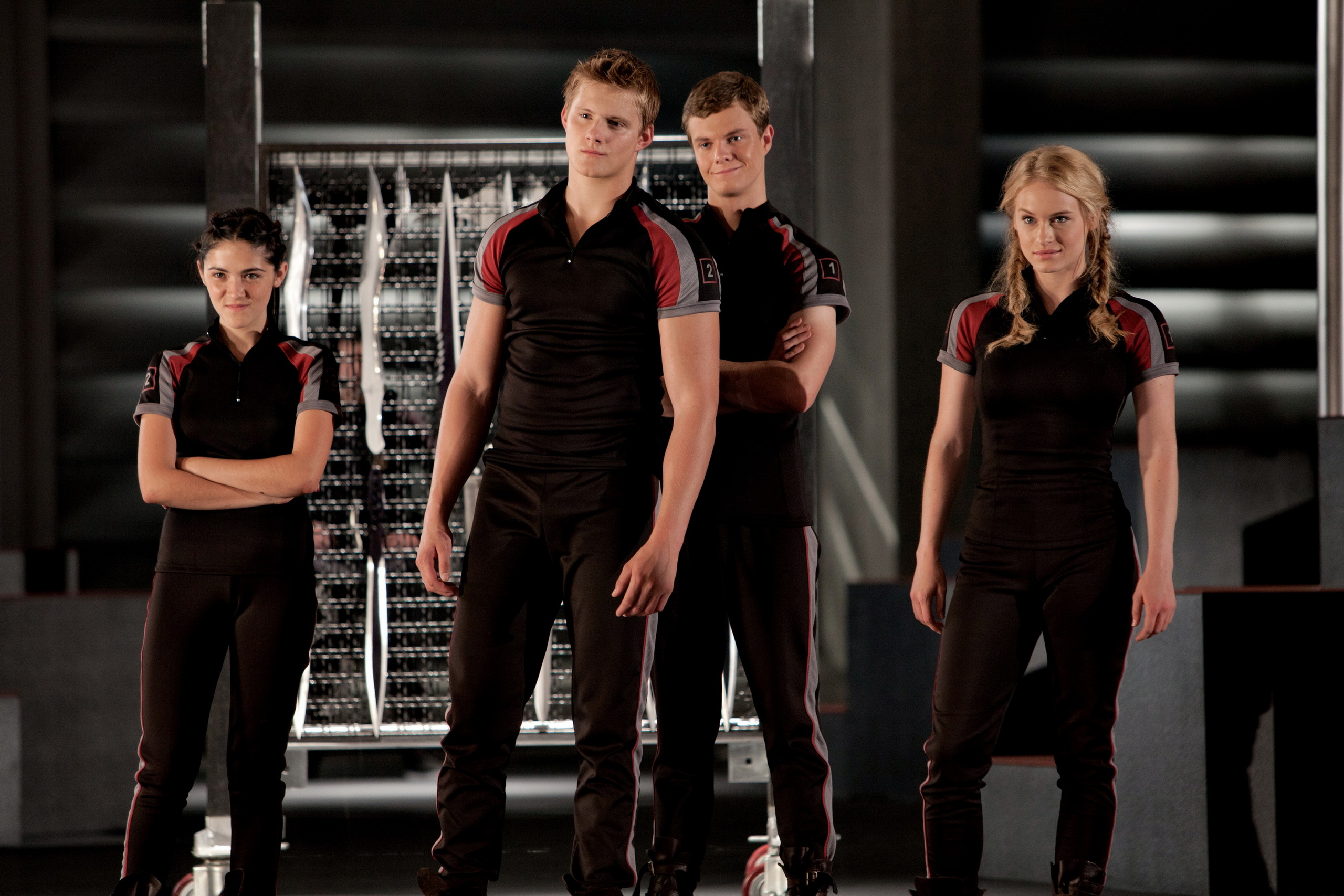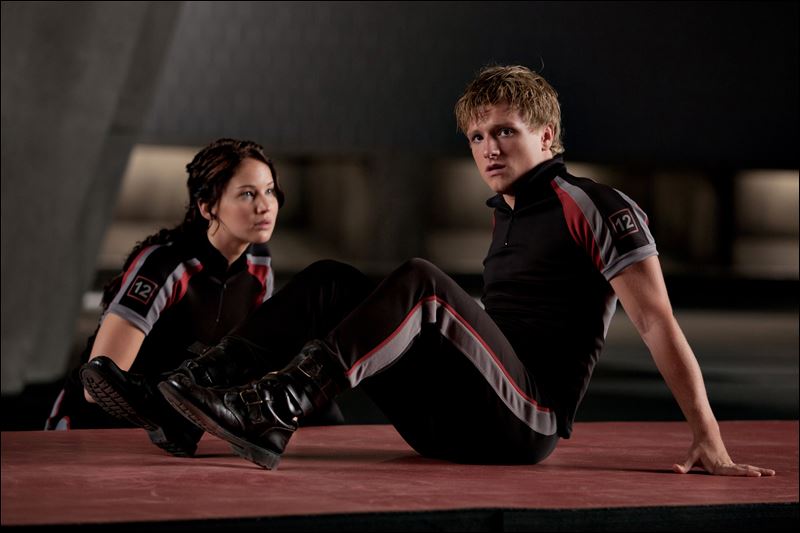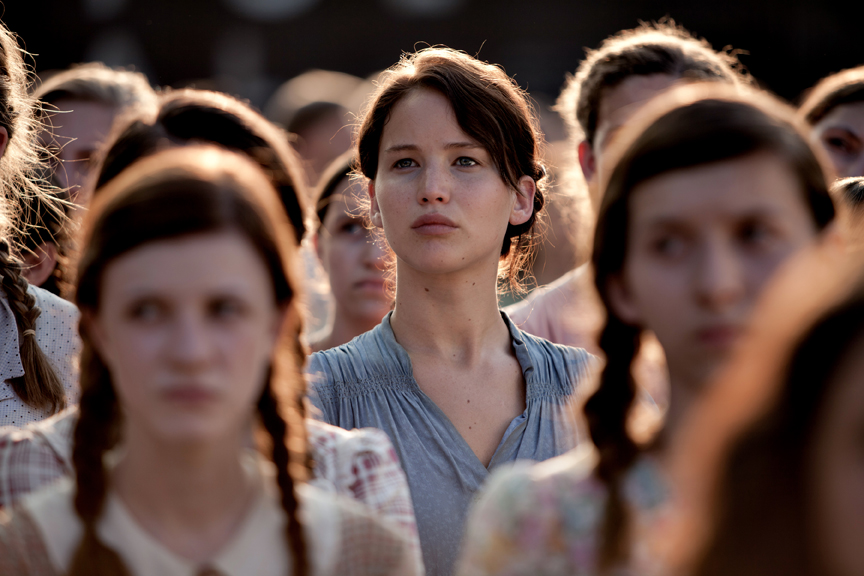Prior to the release, I had read various interviews with director
Gary Ross where he intimated he was committed to pleasing the fans of the
book. This movie was made with the readers
in mind. It was not going to be another
disappointing film rendition, warped to satisfy optimum length standards and
other forms of “Hollywood” treatment. In
this respect, The Hunger Games did a wonderful job, even if it was at the
expense of nonreaders. Therefore, I am
obliged to disclose that I fall into the Reader group before outlining some of
the challenges, gems, and missed opportunities of this film.
[SPOILERS BELOW]
CHALLENGES
1 1. Well-worn Concept
 |
| Careers are so cocky. |
It’s no secret that The
Hunger Games is not a completely novel concept between criticism that the
story is an overrated Battle Royale
and the fact that killing for entertainment using those lower on the social
ladder can be traced back to the Roman Coliseum. That’s to say nothing of Lord of the Flies.
Consequently, one of the challenges going into the film was giving it a new
voice. Like the novel, that voice was
Katniss Everdeen, outstandingly played by Jennifer Lawrence. This is not just a story about kids being
forced to kill each other under an oppressive regime, this is Katniss’
story. It’s about a girl who, unlike
most of the other candidates, is not picked, but volunteers in order to save
her sister. The Hunger Games is not
fatalistic of humanity, showing its ugliness through the corruption of children
as in Battle Royale and Lord of the Flies. There was no way to run away or be saved. It was not shrouded in the mystery of the
wild or a private facility, but rather lauded and publicly performed as a
cultural tradition. The first
installment of the series is about how maintaining humanity in an inhumane
world can spark a rebellion.
2 2. First Person Limited
Ironically, overcoming the challenges of an arguably
overdone concept created an additional challenge. One of the great things about
the book was its first person limited point of view. We saw everything as Katniss saw it. Our view was her view. Her thoughts, and only hers, were ours. That kind of narrative is extremely
challenging to convert to film. Gary
Ross did his best. However, there were a
number of occasions where the film was still unable to do the book justice on
this front. Below, I highlight some of
the ways the film overcame these challenges, and some ways it fell short.
MERITS
1 1. Jennifer Lawrence, Jennifer Lawrence, and oh
yeah, Jennifer Lawrence.
 |
| Let's just cast her in every movie ever from now on. Yes. |
Whether you’re a fan of the books or not, The Hunger Games
movie made one thing abundantly clear to those who weren’t already aware of it:
Jennifer Lawrence is a fantastic actress.
In many ways, she carried this film.
And in many ways, she was supposed to.
A first person limited narrative may have been one of the most difficult
challenges Gary Ross had to face, but it was a feat made possible largely due
to Lawrence’s performance. This is Katniss’
story, it makes sense that she would and should carry the film. I would go so far as to say had they cast
someone different, this film would have been an outright disaster. So kudos to you, Lawrence.
2 2. The Reaping Scene
 |
| The tension was palpable. So was the pink. |
This was done perfectly.
From little details like the way Prim, Katniss’ sister, tucks in the
back of her shirt before she prepares to walk up to the stage after her name is
called, to the heart wrenching moment when Katniss volunteers to take her
place. The thing that impressed me most
about this scene is how the previews did it absolutely no justice at all. I should point out that perhaps my bias, having read the book, sees more than what is communicated on screen. After all, the Reader has the benefit of understanding
exactly how this is affecting Katniss. I
imagine access into her thoughts give this film a depth that it may not have
alone. Still, I believe the reaping is
one of the view scenes where the gravity of the film matches the novel.
3 3. Rue’s
Death
 |
| The simple pleasures of eating wild bird after you've been living on bark and jerky. |
Again, this scene was probably less devastating to those who had not read the book. In the novel Katniss spends much more time taking care of Rue, and narrating how much she reminds her of her sister Prim. The two form an alliance together and Rue tells Katniss about the agricultural district, giving some insight into the how others in Panem live. By the time Rue dies, the Reader has formed a bond vicariously through Katniss who has come to see Rue as another younger sister. In the film, Lawrence does a fantastic job communicating the agony of that loss and despairing at the injustice. However, to a Nonreader, it may have seemed like it was just a sad death of someone too young, rather than the death of a fleshed out character.
One addition the movie made to the book that improved the gravity
it might have lost in translation was depicting the rebellion initiated by Rue’s
death. In the book there are no cuts to
the outside world, or explanations by announcers. Only the mind of Katniss. Seeing how Rue’s district reacted to her
death gave the audience an opportunity to see how Katniss’ attitude, unbeknownst
to her, had begun to influence others.
This insight paves the way nicely for the second installment.
MISSED OPPORTUNITIES
1 1. An R rating
 |
| No, Katniss. Shoot Marvel in the neck not the chest. It was bloodier and more awesome. |
Unfortunately, this is a young adult story with adult
violence. While I doubt it would have
hurt the film too much had they rated it R, from a business perspective it was
just not advisable. Still, I believe the
story lost some of its gravity by leaving out some choice gore. Take this excerpt of Katniss’ hallucinations
after she had been stung by tracker jackers:
“The world begins to bend in
alarming ways. A butterfly balloons into
the size of a house then shatters into a million stars. Trees transform to blood and splash down over
my boots. Ants begin to crawl out of the
blisters on my hands and I can’t shake them free…Someone’s screaming, a long
high pitched scream that never breaks for breath. I have a vague idea it might be me.”
Another example includes transplanting the dead tributes’
eyes onto the pack of dogs at the finale.
Somehow, a pack of large vicious dogs isn’t as eerie and terrifying as knowing
the Capitol had scooped out the dead children’s eyes and put them on dog
mutations just to terrorize the final survivors. Additionally, the end of the Games felt
slightly anti-climatic even to a Reader because the book version had Cato, the
main adversary, moaning and being tortured by the mutant dogs for hours: “It
takes a few moments to find Cato in the dim light, in the blood. Then the raw hunk of meat that used to be my
enemy makes a sound, and I know where his mouth is. And I think the word he’s trying to say is please.”
The lack of gore, and the sense that the movie was running
long may have contributed to the rushed ending.
It's unfortunate because a few more minutes could have made all the
difference. It took only a few sentences
in the book after the aircraft had picked the two up from the arena:
“I startle when I catch someone
staring at me from only a few inches away and then realize it’s my own face
reflecting back in the glass. Wild eyes,
hollow cheeks, my hair in a tangled mat.
Rabid. Feral. Mad…the next thing
I know we’ve landed back on the roof of the Training Center and they’re taking
Peeta but leaving me behind the door. I
start hurling myself against the glass, shrieking and I think I just catch a
glimpse of pink hair—it must be Effie, it has to be Effie coming to my rescue—when
a needle jabs me from behind.”
My biggest qualm about the movie was rushing the
ending. Even if you are making a sequel,
rushing the conclusion is never okay. To
me, skipping over the fact that one of the central characters loses his leg is
sort of a bad thing.
2 2. Secondary Character Depth
 |
| "I think Cato has a crush on you. Go throw something heavy." |
While this is Katniss’ story, the film fell a little short
in developing some of the other characters.
Namely, Peeta and Haymitch. The
film didn’t do a great job conveying that Peeta was not faking his
sincerity. To Nonreaders, his expression
of horror at being called at the reaping was just a scared kid. To a Reader, his pained expression resulted
from knowing he was going to have to kill someone he’d loved his whole life if
he wanted to survive. However, it soon
becomes clear to the Reader that, from the beginning, Peeta knew he was going
to die, because he wanted Katniss to win.
All of his actions were oriented toward staying alive only long enough
to help her win.
Somehow the movie simultaneously
understated Peeta’s affection and overstated Katniss’. Katniss’ expressions of affection for Peeta
were almost all staged for survival in the first installment. As a result she assumed Peeta’s motives were
just as calculating. In the end, she was
told to fake her love for him because to do otherwise would put her family in
peril. In the novel, she asked why Peeta
wasn’t told to do the same and Haymitch replies, “He’s already there.” I don't believe Hutcherson was at fault, but this dynamic was missing from the movie, and
it’s something that would have given more depth to Peeta. As it is, he comes out a little flat.
 |
| "Oh..shit." |
Another character that came up short, though slightly less
so, was Haymitch, the District 12 mentor.
However, this was more due to the film’s writing than any shortcoming of
Woody Harrelson, who did an admirable job.
Haymitch represented what happened to winners. They received a life of luxury in return for
being a victor, but that came at a price as well.
 |
| Slouching is the new black. |
Haymitch is forced to mentor District 12
children, who have little to no chance of winning. Year after year, this man has to watch as the
kids he is supposed to be helping get slaughtered at his direction. It’s no wonder he had given up. Hopefully, Haymitch will be developed more in
the other installments.
FINAL THOUGHTS
 |
| "Look, fire is the new slouching. I don't make the rules" |
Though sometimes faltering in carrying the depth of the book, the running theme of
The Hunger Games movie is that it is factually faithful. However, the lines and logical leaps a
Nonreader would have to make to experience what a Reader sees is a bit too attenuated,
leaving those who have not read it in the dark as to some of the story’s finer
moments. Overall however, I have seen
much worse novel-to-film renditions. In
fact, this was one of the best I’ve ever seen.
Again, with the caveat that I am a Reader: 8.5/10 or A-


No comments:
Post a Comment